
Sir Richard Starkey, known professionally as Ringo Starr, is an English musician, songwriter and actor who achieved international fame as the drummer for the Beatles. Starr occasionally sang lead vocals with the group, usually for one song on each album, including "Yellow Submarine" and "With a Little Help from My Friends". He also wrote and sang the Beatles songs "Don't Pass Me By" and "Octopus's Garden", and is credited as a co-writer of four others.
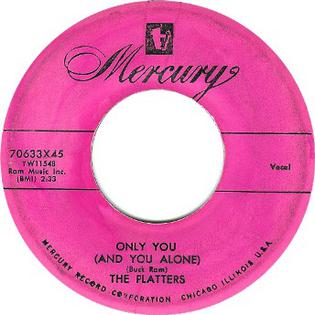
"Only You (And You Alone)" (often shortened to "Only You") is a doo wop song composed by Buck Ram, the manager of the Platters, the group that made the song famous in the US, the UK and Belgium. The Platters's lead vocals are by Tony Williams.
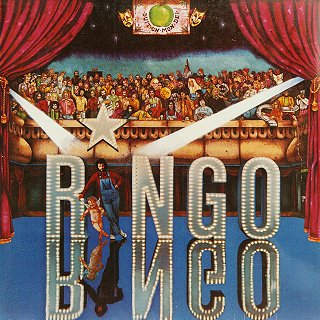
Ringo is the third studio album by English musician Ringo Starr, released in 1973 on Apple Records. It peaked at No. 7 on the UK Albums Chart and No. 2 on the Billboard 200 and has been certified platinum by the RIAA. In Canada, it reached No. 1 on the RPM national albums chart.
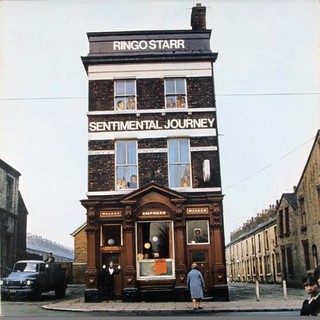
Sentimental Journey is the debut solo album by the English rock musician Ringo Starr. It was released by Apple Records in March 1970 as the Beatles were breaking up. The album is a collection of pre-rock 'n' roll standards that Starr recalled from his childhood in Liverpool. As a departure from the experimental quality that had characterised solo LPs by George Harrison and John Lennon since 1968, it was the first studio album by an individual Beatle to embrace a popular music form.

Goodnight Vienna is the fourth studio album by Ringo Starr. It was recorded in the summer of 1974 in Los Angeles, and released later that year. Goodnight Vienna followed the commercially successful predecessor Ringo, and Starr used many of the same players, including Billy Preston, Klaus Voormann, Robbie Robertson, Harry Nilsson, and producer Richard Perry.

Blast from Your Past is a compilation album by English rock musician Ringo Starr, released on Apple Records in 1975. It is both Starr's first compilation LP and his final release under his contract with EMI. It was also the last album to be released on the Beatles' Apple label until it was revived in the 1990s.

Time Takes Time is the tenth studio album by Ringo Starr. His first studio album since 1983's Old Wave, it followed a successful 1989–90 world tour with his first All-Starr Band. Released in 1992, Time Takes Time was a critically-acclaimed comeback album, and featured several celebrity guests including Brian Wilson, Harry Nilsson and Electric Light Orchestra front-man Jeff Lynne.

"Back Off Boogaloo" is a song by the English rock musician Ringo Starr that was released as a non-album single in March 1972. Starr's former Beatles bandmate George Harrison produced the recording and helped Starr write the song, although he remained uncredited as a co-writer until 2017. Recording took place in London shortly after the pair had appeared together at Harrison's Concert for Bangladesh shows in August 1971. The single was a follow-up to Starr's 1971 hit song "It Don't Come Easy" and continued his successful run as a solo artist. "Back Off Boogaloo" peaked at number 2 in Britain and Canada, and number 9 on America's Billboard Hot 100. It remains Starr's highest-charting single in the United Kingdom.
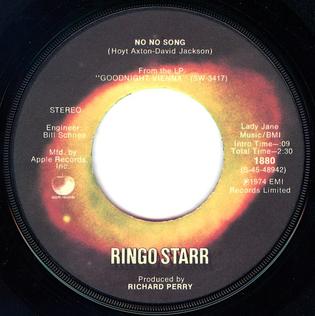
"No No Song" is a 1974 song by English musician Ringo Starr. Written by Hoyt Axton and David Jackson, it appeared on Starr's 1974 album, Goodnight Vienna. It was released as a single in the US on 27 January 1975, backed with "Snookeroo," and reached No. 1 in Canada, #3 in the Billboard charts, becoming his 7th and last top 10 hit. It also reached No. 1 on Cash Box charts in the US.
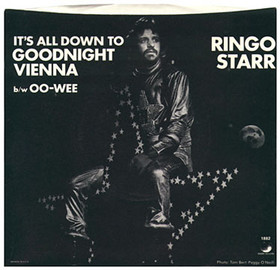
"(It's All Down to) Goodnight Vienna" is a song written by John Lennon, and released by Ringo Starr as the opening title track to his 1974 album Goodnight Vienna. A brief reprise closes the album. Released as the third single, this version is a medley combination of the two. The single was released in the US on 2 June 1975.

"Snookeroo" is a song written by Elton John and Bernie Taupin and released by Ringo Starr on his 1974 album Goodnight Vienna.
Vincent "Vini" Poncia Jr. is an American musician, songwriter and record producer.

Photograph: The Very Best of Ringo Starr is a career-spanning best-of compilation album by Ringo Starr and is the first such album since the releases of 1975's Blast from Your Past and 1989's Starr Struck: Best of Ringo Starr, Vol. 2. The album was released in the UK on 27 August 2007, and in the US on 28 August.
"All by Myself" is a 1975 song by Eric Carmen.
Goodnight, Vienna is a 1932 British musical film directed by Herbert Wilcox and starring Jack Buchanan, Anna Neagle and Gina Malo. Two lovers in Vienna are separated by the First World War, but are later reunited.
Snooker is a cue sport, that is played on a green baize-covered table with pockets in each of the four corners and in the middle of each of the long side cushions.
"Six O'Clock" is a song by the English rock musician Ringo Starr from his 1973 album Ringo. It was written by Starr's former Beatles bandmate Paul McCartney and the latter's wife, Linda, who also participated in the recording of the song. It was the first time McCartney and Starr had worked together since the Beatles' break-up in 1970. Their collaboration reflected an easing of the tensions that had existed between the two musicians for much of that period.
This page is based on this
Wikipedia article Text is available under the
CC BY-SA 4.0 license; additional terms may apply.
Images, videos and audio are available under their respective licenses.











